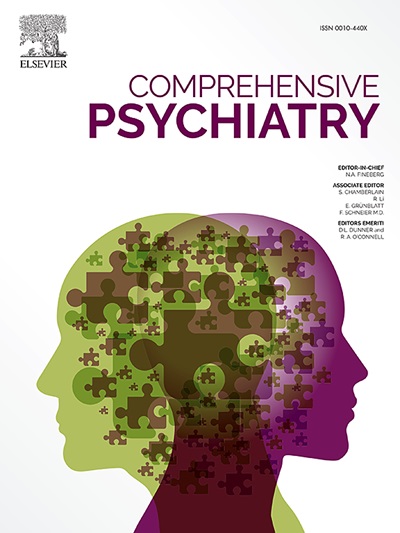重度抑郁症、双相情感障碍和精神分裂症谱系障碍的血液DNA甲基化谱
IF 4.2
2区 医学
Q1 PSYCHIATRY
引用次数: 0
摘要
DNA甲基化(DNAm)谱的改变与情感和精神障碍有关。然而,目前还没有全面了解与诊断组、病程和其他临床变量相关的外周dna谱。特别是,缺乏探索诊断之间的共性和差异的研究。在这里,我们对德国FOR2107的跨诊断队列进行了系统的表观遗传学表征,包括重度抑郁症(MDD, n = 342)、双相情感障碍(BD, n = 99)或精神分裂症谱系障碍(SSD, n = 101)和健康对照(HC, n = 339)。对于183例重度抑郁症和178例HC,我们评估了来自两年随访研究访问的额外DNAm数据。为了探索诊断组之间和诊断组之间的DNAm差异,进行了病例对照和病例甲基组全关联研究。我们的样本进一步使用甲基化风险评分(MRS)对MDD和SSD进行表征。最后,研究了表观遗传年龄加速,并将其与大脑年龄加速的测量结果进行了比较。我们发现很少有甲基组与诊断组有显著关联。MDD的MRS在诊断组之间没有差异,在调整吸烟行为和BMI后,SSD患者与HC患者相比,SSD患者的MRS增加也没有保持显著性。与HC相比,SSD的表观遗传年龄加速的增加最为明显,在调整协变量后,这一点并不显著。未观察到表观遗传与脑老化加速之间的相关性。我们的研究结果强调了精神病学表观遗传学研究中潜在混杂因素的相关性,并有助于在情感和精神障碍中进行越来越多的dna谱研究。本文章由计算机程序翻译,如有差异,请以英文原文为准。
Blood-based DNA methylation profiles in major depressive disorder, bipolar disorder, and schizophrenia spectrum disorders
Alterations in DNA methylation (DNAm) profiles have been implicated in affective and psychotic disorders. However, no comprehensive understanding of peripheral DNAm profiles associated with diagnostic groups, course of illness, and other clinical variables has emerged yet. In particular, studies exploring commonalities and differences across diagnoses are lacking. Here we conducted a systematic epigenetic characterization of the transdiagnostic German FOR2107 cohort, including individuals with major depressive disorder (MDD, n = 342), bipolar disorder (BD, n = 99), or a schizophrenia spectrum disorder (SSD, n = 101) and healthy controls (HC, n = 339). For 183 MDD cases and 178 HC, we assessed additional DNAm data from the two-year follow-up study visit. To explore DNAm differences between and across diagnostic groups, case-control and case-case methylome-wide association studies were performed. Our sample was further characterized using methylation risk scores (MRS) for MDD and SSD. Finally, epigenetic age acceleration was examined and compared to a measure of brain age acceleration. We identified few methylome-wide significant associations with diagnostic groups. MRS for MDD did not differ between diagnostic groups, and an increase in MRS for SSD in SSD compared to HC did not remain significant when adjusting for smoking behavior and BMI. An increase in epigenetic age acceleration was most evident for SSD compared to HC, which did not remain significant when adjusting for covariates. No correlation between epigenetic and brain age acceleration was observed. Our findings emphasize the relevance of potential confounding factors in epigenetics research in psychiatry and contribute to a growing body of studies on DNAm profiles across affective and psychotic disorders.
求助全文
通过发布文献求助,成功后即可免费获取论文全文。
去求助
来源期刊

Comprehensive psychiatry
医学-精神病学
CiteScore
12.50
自引率
1.40%
发文量
64
审稿时长
29 days
期刊介绍:
"Comprehensive Psychiatry" is an open access, peer-reviewed journal dedicated to the field of psychiatry and mental health. Its primary mission is to share the latest advancements in knowledge to enhance patient care and deepen the understanding of mental illnesses. The journal is supported by a diverse team of international editors and peer reviewers, ensuring the publication of high-quality research with a strong focus on clinical relevance and the implications for psychopathology.
"Comprehensive Psychiatry" encourages authors to present their research in an accessible manner, facilitating engagement with clinicians, policymakers, and the broader public. By embracing an open access policy, the journal aims to maximize the global impact of its content, making it readily available to a wide audience and fostering scientific collaboration and public awareness beyond the traditional academic community. This approach is designed to promote a more inclusive and informed dialogue on mental health, contributing to the overall progress in the field.
 求助内容:
求助内容: 应助结果提醒方式:
应助结果提醒方式:


